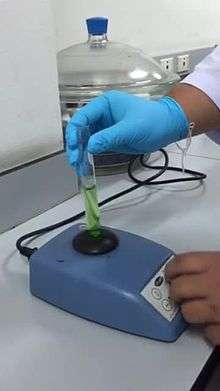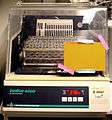Shaker (laboratory)

A shaker is a piece of laboratory equipment used to mix, blend, or to agitate substances in tube(s) or flask(s) by shaking them, which is mainly used in the fields of chemistry and biology. A shaker contains an oscillating board which is used to place the flasks, beakers, test tubes, etc. Although the magnetic stirrer has come to replace the uses of shaker lately, the shaker is still a preferred choice of equipment when dealing with such large volume substances, or simultaneous agitation is required.[1]
Types of shakers
Vortex shaker
Invented by Jack A. Kraft and Harold D. Kraft in 1962, a Vortex Shaker is usually a small device used to shake, or mix small vials of liquid substance. Its most standout characteristic is that it works by the user putting a vial on the shaking platform and turn it on, thus the vial is shaken along with the platform. Vortex Shaker is vary variable in term of speed adjustment, one can continuously change the shaking speed while shaking by turning the switch.[2]
Platform shaker
A kind of shaker that has a table board that oscillates horizontally. The liquids to be stirred are held in beakers, jars, or erlenmeyer flasks that are placed over the table; or, sometimes, in test tubes or vials that are nested into holes in the plate.[3]
Orbital shaker
Orbital Shaker has a circular shaking motion with a slow speed (25-500 rpm). It is suitable for culturing microbes, washing blots, and general mixing. Some of its characteristics are that they do not create vibrations, and they produce low heat compared to other kinds of shakers, which make it ideal for culturing microbes. Moreover, it can be modified by placing it in an incubator to create an incubator shaker due to its low temperature and vibrations.[4]
Incubator shaker
Incubator Shaker (or thermal shaker) can be considered a mix of an incubator and a shaker. It has an ability to shake, while maintain optimal conditions for incubating microbes or DNA replications. This equipment is very useful since in order for a cell to grow, it needs Oxygen, and nutrients, and that require shaking so that they can be distributed evenly around the culture.[5]

Additional images
-

Temperature Controlled Shaker
-

Laboratory thermoshaker for test tubes-01
-

Shaking incubator for culture tubes
-

Vortex Shaker
See also
References
- ↑ Buie, John. "Evolution of Biological Shakers and Stirrers". Lab Manager. Retrieved 12 February 2016.
- ↑ Johanna. "What is Vortex mixer and Vortex mixer functions ?". Laboratory Micro Centrifuge. Retrieved 10 March 2016.
- ↑ "Laboratory Platform Shakers". Biocompare. Retrieved 10 March 2016.
- ↑ BT&C Inc. "Standard Orbital Shaker". Retrieved 10 March 2016.
- ↑ "Laboratory Incubator Shakers". Biocompare. Retrieved 10 March 2016.